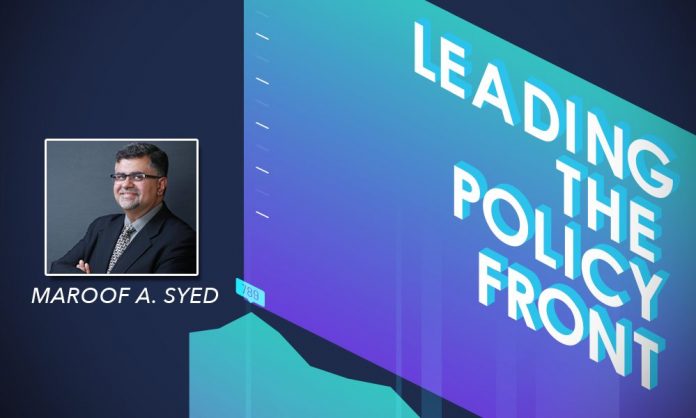As originally published in Synergyzer Issue 3|2019

Maroof Syed, CEO CERP
What is CERP?
Maroof Syed: The Centre for Economic Research in Pakistan, or CERP, is a leading independent nonpartisan think tank focused on improving decision making in Pakistan through rigorous quantitative research, engaging with policy counterparts with real policy challenges, and designing and advising on high impact reforms based on data.
At CERP, we also deploy cutting edge pedagogy tailored for Pakistan and provide data insights to private sector on product and process design. Ultimately, our mission is to deepen the culture of evidence and improve decision making in Pakistan.
With a staff of 150+ people in Lahore, Karachi and Islamabad, we have 23 different programs. We also have over 80 research fellows from around the world including institutions like Harvard, MIT, Duke, Stanford, etc. interested in researching and working in Pakistan. While we are focused on sustainable growth at CERP, our mission is to deepen the culture of evidence and improve decision making in Pakistan across multiple sectors. Hence we are currently working in five areas.
1) Quantitative Research;
2) Executive Education where we offer rigorous training programs to public and private sector on how to use date and evidence in order to improve decision making. We also work on capacity building by teaching the use of data to civil servants and training them in data-driven decision-making, policymaking, leadership etc. For instance, we have trained over 3100 civil servants on how to use data in decision making. We have started at the base-line level and our goal is to reach every single civil servant in Pakistan in the next 6 to 8 years.
3) Our in-house survey unit which employs rigorous cutting-edge data collection practices with strict quality control measures.
4) Data analytics is one of our core expertise, which we are providing to the private sector as well. For instance, financial institutions are looking to innovate on credit scoring models and how to smartly cross-sell within their customer base. Or how pharma companies can improve their distribution process or inventory design based on data.
5) Policy Advisory, where we try to provide non-partisan advice based on evidence.
What do you mean by ‘evidence-based think tank’?
Think of it as basically a policy research institution. CERP literally collects data in the field from households, firms and institutions that allow us to adjust for the local context. Then we have a team of data and research analysts who work through that data, consequently informing policy analysis.
It is built on the basic premise that experimentation and iteration is the key to refinement, which means that policy, like anything else, is not something you can get just right in the first go. Rather the process is an adaptive and iterative one through which policy is refined. Hence, in Pakistan no one is approaching the policy process like CERP.
Here I should also point out that the policy process involves working with stakeholders not just from the government, rather in the 21st century, governance requires taking onboard the private sector, multi-lateral institutions, NGO’s etc. For example, Uber collects a lot of consumer or rider data that they can share with the government which can impact and inform urban planning and congestion handling. Also with the kind of data analysis they are looking for, it can also help the government in regulating financial inclusion and mobility for women etc.
Right. And how much is CERP involved with policymaking?
CERP influences the process of policymaking by providing data, expertise and insight through our work.
Most of the time, the government is made up of political actors who come in for five years, their focus naturally being on re-election. On the other hand, our focus is on long term structural growth and reforms in Pakistan where it does not matter who is in office.
To better understand this, you can look at this as opportunity and preparation. Opportunity is when a good leader comes in, not necessarily at the highest level, but even in a single government department, an innovator or a catalyst can come in who helps matters move forward. On the contrary, preparation is the boring work in which tons of data is analyzed and insights are derived. But when preparation meets opportunity, the impact can be much more amplified. That is what CERP does.
You were a tech-preneur before you entered the public policy space. What influenced this decision?
I have been a tech-entrepreneur as well as an investor, but the reason I switched towards what I am doing right now is that a number of times, the policy environment changes, changing the rules of the game, which wreaks havoc with all the stakeholders within that ecosystem. Uncertainty is what kills investment and confidence in the economy.
To influence such a scenario, one can use advocacy as an industry, but to really transform the system, you have to transform its core and I felt strongly that we need structural changes in Pakistan from the policy end. This prompted me to shift to the public policy space so that I can play my part.
Do you think we need changes in policy for startups to thrive?
Not just for startups, rather in Pakistan it’s imperative to build an environment where businesses in general can thrive. Currently we rank 143rd with respect to Ease of Doing Business, meaning we are hampering our ability to build new business and grow existing ones. Export is an indicator which tells you how globally competitive a country is and in the last forty years, Pakistan has remained flat in terms of exports as a percentage of GDP. Hence, to increase exports we have to enable the private sector to scale and create an environment which not only facilitates growth of businesses, but introduces export-oriented policies, legal structures etc. To support this, policy decisions and regulatory frameworks need to be based on evidence and data rather than intuition and best intentions.
Talking about policies and regulatory frameworks, when services like Uber, Careem etc. are introduced, they have an impact on the earlier prevalent ecosystem, where self-employed transporters like taxi drivers might suffer from losing work. Are any policies curated that might safeguard them from the impact?
That’s a loaded question. Entrepreneurs are often the driving force behind what Joseph Schumpeter called, creative destruction. Unfortunately, some entrepreneurs can also ignore negative externalities of their business idea or not internalize it sufficiently in to their model.
We cannot import success so our innovation needs to be different, where it is not innovation for the sake of innovation; rather deeply embedded in our local problems and market failures, and appropriate diagnosis of those problems.
Innovation is not about yellow walls and red furniture, it is deeply cultural. Allowing space for decent innovation and learning from failures is crucial. We do not have to chase the (Silicon) Valley because we cannot import success. We have to embed our innovation in real problems. You can create a Facebook, which arguably never factored in the social costs; or you can create a Tesla which is not just a product but a mission driven intervention against climate change.
